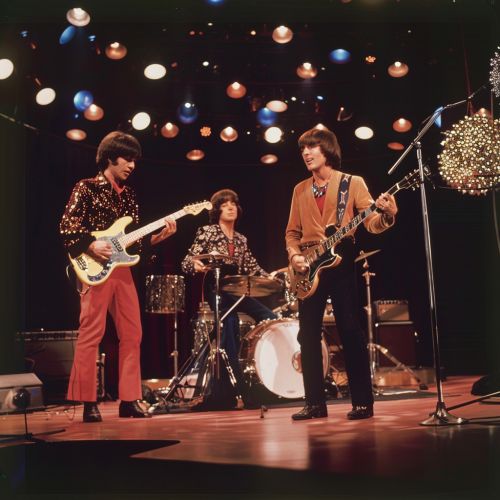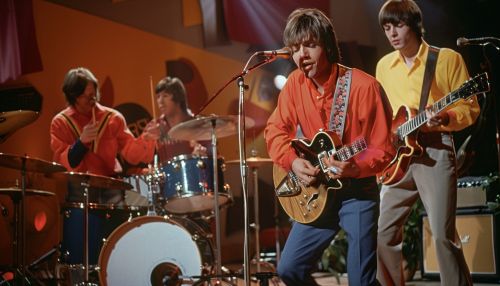The Monkees
History
The Monkees were a pop-rock band formed in Los Angeles in 1965, created specifically for a television series of the same name. The group was composed of Micky Dolenz, Michael Nesmith, Peter Tork, and Davy Jones. The Monkees were initially conceived as a television counterpart to The Beatles, and their music was produced by a team of professional songwriters and session musicians. Despite their manufactured origins, The Monkees eventually gained creative control over their music and became a significant force in the music industry during the late 1960s.


Formation and Early Years
The Monkees were formed by television producers Bob Rafelson and Bert Schneider, who sought to create a TV show about a fictional band. The casting call attracted over 400 applicants, including Stephen Stills and Harry Nilsson. Ultimately, Dolenz, Nesmith, Tork, and Jones were selected for their distinct personalities and musical abilities. The show debuted on NBC on September 12, 1966, and quickly became a hit.
The band's early music was produced by Don Kirshner, who employed top songwriters like Tommy Boyce and Bobby Hart, as well as Carole King and Gerry Goffin. Their debut single, "Last Train to Clarksville", released in August 1966, reached number one on the Billboard Hot 100. The Monkees' self-titled debut album also topped the charts, establishing them as a commercial success.
Creative Control and Musical Evolution
By 1967, The Monkees began to push for more control over their music. Tensions arose between the band members and Kirshner, culminating in his dismissal. The Monkees took over the production of their third album, "Headquarters", which showcased their growing musical talents and featured all four members playing their instruments. The album was a critical and commercial success, peaking at number one on the Billboard 200.
The band's subsequent albums, "Pisces, Aquarius, Capricorn & Jones Ltd." and "The Birds, The Bees & The Monkees", continued to demonstrate their evolving sound, incorporating elements of psychedelic rock and country. Despite their success, internal conflicts and the changing musical landscape led to the departure of Tork in 1968 and Nesmith in 1970.
Decline and Disbandment
The Monkees' television show was canceled in 1968, and their feature film "Head" was a commercial failure, despite later gaining a cult following. The band's popularity waned, and they struggled to maintain their relevance in the face of emerging musical trends. By 1970, The Monkees had effectively disbanded, with Dolenz and Jones continuing to perform as a duo for a brief period.
Musical Style and Influence
The Monkees' music was characterized by its catchy melodies, tight harmonies, and polished production. Their early work was heavily influenced by the British Invasion sound, but they later incorporated elements of folk, country, and psychedelic rock. The Monkees were pioneers in the use of music videos, with their television show featuring innovative and often surreal visual sequences that predated the rise of MTV.
Despite their initial reputation as a "manufactured" band, The Monkees earned respect for their musical abilities and contributions to the pop-rock genre. Their influence can be seen in the work of later artists and bands, including The Partridge Family and The Archies.
Legacy
The Monkees' legacy is multifaceted, encompassing their impact on television, music, and popular culture. They were one of the first bands to successfully transition from a television show to a legitimate musical act, paving the way for future multimedia ventures. The Monkees' music continues to be celebrated for its craftsmanship and enduring appeal.
The band's influence extends beyond their own discography, as they helped to popularize the concept of the music video and contributed to the development of the modern boy band. The Monkees have been cited as an inspiration by numerous artists, and their songs have been covered by a wide range of musicians.
Reunions and Later Years
The Monkees reunited several times over the years, beginning with a 20th-anniversary tour in 1986 that sparked renewed interest in their music. Subsequent reunions included new albums and tours, with varying lineups due to the availability and willingness of the original members. Notable reunion projects include the albums "Pool It!" (1987) and "Justus" (1996), as well as the 50th-anniversary album "Good Times!" (2016), which featured contributions from contemporary songwriters like Rivers Cuomo and Ben Gibbard.
The Monkees continued to perform and record until the death of Davy Jones in 2012. The surviving members, Dolenz, Nesmith, and Tork, continued to honor the band's legacy through various projects and tours. Peter Tork passed away in 2019, and Michael Nesmith died in 2021, leaving Micky Dolenz as the sole surviving member.
